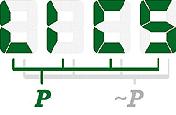Paper: On the parallel complexity of model checking in the modal mu-calculus (at LICS 1994)
Authors: Shipei Zhang Oleg Sokolsky Scott SmolkaAbstract
The modal mu-calculus is an expressive logic that can be used to specify safety and liveness properties of concurrent systems represented as labeled transition systems (LTSs). We show that Model Checking in the Modal Mu-Calculus (MCMMC)-the problem of checking whether an LTS is a model of a formula of the propositional modal mu-calculus-is P-hard even for a very restrictive version of the problem involving the alternation-free fragment. In particular, MCMMC is P-hard even if the formula is fixed and alternation-free, and the LTS is deterministic, acyclic, and has fan-in and fan-out bounded by 2. The reduction used is from a restricted version of the circuit value problem known as Synchronous Alternating Monotone Fanout 2 Circuit Value Problem. Specifically, we exhibit NC-algorithms for two potentially useful versions of the problem, both of which involve alternation-free formulas containing a constant number of fixed point operators: 1) the LTS is a finite tree with bounded fan-out; and 2) the formula is A-free and the LTS is deterministic and over an action alphabet of bounded size. In the course of deriving our algorithm for 2), we give a parallel constant-time reduction from the alternation-free modal mu-calculus to Datalog. We also provide a polynomial-time reduction in the other direction thereby establishing an interesting link between the two formalisms
BibTeX
@InProceedings{ZhangSokolskySmolka-Ontheparallelcomple,
author = {Shipei Zhang and Oleg Sokolsky and Scott Smolka},
title = {On the parallel complexity of model checking in the modal mu-calculus },
booktitle = {Proceedings of the Ninth Annual IEEE Symp. on Logic in Computer Science, {LICS} 1994},
year = 1994,
editor = {Samson Abramsky},
month = {July},
pages = {154--163},
location = {Paris, France},
publisher = {IEEE Computer Society Press}
}
